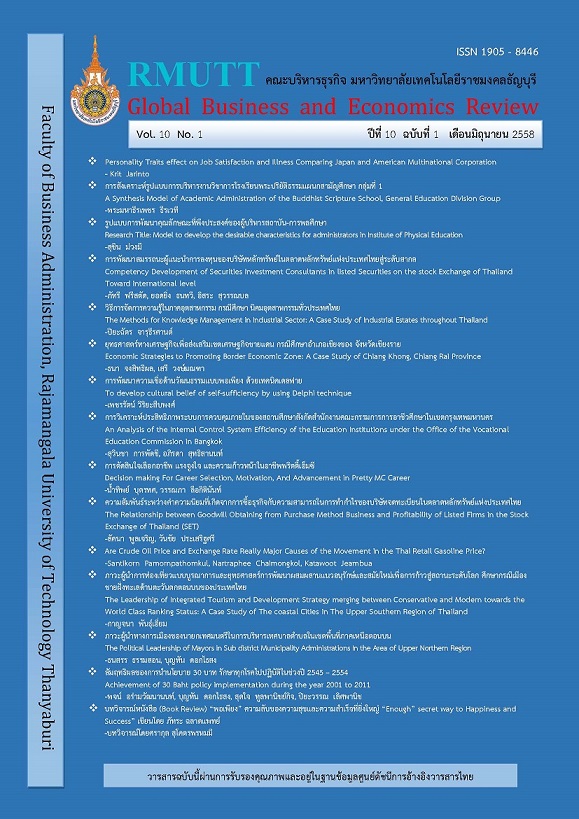ACHIEVEMENT OF 30 BAHT POLICY IMPLEMENTATION DURING THE YEAR 2001 TO 2011
Keywords:
Achievement of 30 Baht, Policy ImplementationAbstract
The research on the achievement on the implementation of the 30 Baht Health Care for all sickness treatment during the year 2002-2011 has two main purposes to study the achievement of the implementation of the 30 Baht Health Care for all sickness treatment policy during the year 2002-2011 as well as to give suggestions on the improvement on factors that will have great effect on the achievement of implementation of the 30 Baht Health Care Program. This research employed both qualitative and quantitative analysis approaches, which are, by using the in-depth interview and by using questionnaires respectively. he sample group are group of managers of different level 25 persons and the group of those who receive the services in various hospital and clinics in all parts of the country, both provincial and sub-province total 300 persons, and the group of the service providers of the same locations afore mentioned total 100 persons respectively. The findings from the research are: first, the implementation of the 30 Baht health care for all sickness treatment Policy during the year 2002-2011, the research found out that both the services receivers and the services providers have their moderate satisfaction and thus the achievement of the Program is a moderate success. The second result is composed of eight topics, which are factors that have effect on the implementation of 30 Baht health care for all sickness treatment with the suggestions to improve such factors for the effectiveness in implementing the 30 Baht health care for all sickness treatment in the next phases. (1) To set up this 30 Baht health care for all sickness treatment program as the National Agenda, and must be carried on by all successive governments. All groups of people or the majority will benefit from this Project and meet the people’ basic requirement and this will give way for the effectiveness in Politics. (2) As for the control of governmental expenditures on public health care and the reduction of people’ burden on health expenditures, this will yield the effectiveness in Economics. (3) By giving people a chance of easy access to sickness treatment, and that they are covered with health insurance will also give effectiveness in Society. (4) By giving the 30 Baht health care for all sickness treatment project the same services standards as other kind of other health insurance and such services are available at all hospitals, has enough budget for it, with enough medical staffs, will also result in the effectiveness of Project Management. (5) By giving people the ability to inspect the expenditures of the project in order that the budget will be well spent, will give the effectiveness in Transparency. (6) By giving the people an easy access to the services, to have a good health with no sickness, will give the effectiveness to Community Strength. (7) Besides, to achieve the effectiveness in Satisfaction, both the services receivers and the services providers must all be satisfied with the fast and convenient deliveries of the patient. (8) With such easiness in accessing to the services at all hospitals, this will also give the effectiveness in Co-operations. All these suggestions can be used and apply in setting up the direction of implementing the Populist Policy of 30 Baht health care for all sickness treatment project in the next phase efficiently.
References
กุลธน ธนาพงศธร. (2520). หลักการกำหนดนโยบายของรัฐ. กรุงเทพฯ: มหาวิทยาลัยธรรมศาสตร์.
ชุบ กาญจนประกร. (2508). การกำหนดนโยบายบริหารของเทศบาล. กรุงเทพฯ: ศักดิ์โสภาการพิมพ์.
ธีรยุทธ บุญมี. (2544, 26 มกราคม). ทิศทางประเทศไทย: เมื่อโลกหยุดค้อมหัวให้ตะวันตก. มติชน.
ธีรยุทธ บุญมี. (2545). เทคโนแครต ตายแล้ว ปัญญาชนไทยตายแล้ว 72 ปี จิตร ภูมิศักดิ์. กรุงเทพฯ: สำนักพิมพ์แห่งจุฬาลงกรณ์มหาวิทยาลัย.
ธีรยุทธ บุญมี. (2546, 10-16 มกราคม). ผลประเมินเศรษฐกิจ สังคมวัฒนธรรม และการเมืองไทย หลังวิกฤต เศรษฐกิจ. สยามรัฐสัปดาห์วิจารณ์.
ผาสุก พงษ์ไพจิตร และคริส เบเคอร์. (2542). เศรษฐกิจการเมืองไทยสมัยกรุงเทพฯ. กรุงเทพฯ: ไทยวัฒนาพาณิชย์.
วรเดช จันทรศร. (2540) การนำนโยบายไปปฏิบัติ. กรุงเทพฯ: กราฟิคฟอร์แมท (ไทยแลนด์).
วิทยากร เชียงกูล. (2545). อธิบายศัพท์เศรษฐศาสตร์การเมือง: Dictionary of radical political economics. กรุงเทพฯ: สายธาร.
วิทยา กุลสมบูรณ์, สุวารี เตียงพิทักษ์ และสถิตย์พงศ์ ธนวิริยะกุล. (2545). ระบบยาของประเทศไทย. กรุงเทพฯ: คณะกรรมการโครงการศึกษาวิเคราะห์ระบบยาของประเทศไทย.
วิโรจน์ ณ ระนอง และอัญชนา ณ ระนอง. (2545). “จากสงเคราะห์คนจนสู่การสร้างหลักประกันสุขภาพ ถ้วนหน้า: วิวาทะสองปรัชญาเบื้องหลังโครงการ 30 บาท,” บทความประกอบการประชุมวิชาการหนึ่งทศวรรษสถาบันวิจัยระบบสาธารณสุข. (ครั้งที่ 1) (วันที่ 5-7 สิงหาคม พ.ศ. 2545).
วิโรจน์ ณ ระนอง และอัญชนา ณ ระนอง. (2545, พฤศจิกายน). การติดตามประเมินผลการจัดหลักประกันสุขภาพถ้วนหน้า. สถาบันวิจัยเพื่อ การพัฒนาประเทศไทย (TDRI), 1(1).
ศูนย์ปฏิบัติการหลักประกันสุขภาพถ้วนหน้า. (2545, มกราคม). แนวทางการสร้างหลักประกันสุขภาพถ้วนหน้าในระยะเปลี่ยนผ่าน. ฉบับปรับปรุงแก้ไขเพิ่มเติมครั้งที่ 1 ตามมติที่ประชุมศูนย์ปฏิบัติการ War Room. กระทรวงสาธารณสุข.
ศุภชัย ยาวะประภาษ. (2540). นโยบายสาธารณะ (พิมพ์ครั้งที่ 3). กรุงเทพฯ: โรงพิมพ์แห่งจุฬาลงกรณ์มหาวิทยาลัย.
สมชาย ภคภาสน์วิวัฒน.์ (2546). การบริหารเชิงกลยุทธ์. กรุงเทพฯ: อมรินทร์.
สมบัติ ธำรงธัญวงศ์. (2548). นโยบายสาธารณะ แนวคิด การวิเคราะห์และกระบวนการ. กรุงเทพฯ: คณะรัฐประศาสนศาสตร์ สถาบันบัณฑิตพัฒนบริหารศาสตร์.
ไสว บุญมา. (2546). ประชานิยม: หายนะจากอาร์เจนตินาถึง?. กรุงเทพฯ: เนชั่นบุ๊คส์ อินเตอร์ เนชั่นแนล.
สำนักงานคณะกรรมการพัฒนาเศรษฐกิจและสังคมแห่งชาติ. (2546). รายงานการประเมินนโยบายเศรษฐกิจ รากหญ้าและหลักประกันสังคม. กรุงเทพฯ: สำนักงานคณะกรรมการพัฒนาการเศรษฐกิจและสังคมแห่งชาติ.
สำนักนโยบายและแผน สำนักงานหลักประกันสุขภาพถ้วนหน้า. (2550). รายงานประจำปี การสร้างหลักประกันสุขภาพแห่งชาติ. สำนักงานหลักประกันสุขภาพแห่งชาติ.
อมร รักษาสัตย์. (2520). การพัฒนานโยบาย. กรุงเทพฯ: สถาบันบัณฑิตพัฒนบริหาร.
อัมมาร สยามวาลา. (2545, 18-24 มกราคม). ทักษิณโณมิคส์. สยามรัฐสัปดาห์วิจารณ์.
เอนก เหล่าธรรมทัศน์. (2549). ทักษิณา-ประชานิยม. กรุงเทพฯ: มติชน.
Van Harn, C. E., & Van Meter, D. S. (1976). The policy implementation process policy: A framework: administration and society. Boston: Sage Publication.
Easton, D. (1953). The political system: An inquiry into the state of political science. New York: Alfred A Knopf.
Easton, D. (1971). The political system: An inquiry into the state of political science. New York: Alfred A Knopf.
Mazmanian, D. A., & Sabatier, P. A. (1989). Implementation and public policy, with a new postscript. New York: University Press of America.
Sharrkansky, I. (1970). The political scientist and policy analysis. Chicago: Markham Publishing.
Taggart, P. (2002). Populism and the pathology of representative Politics. In: Meny, Yves and Surel, Yves (eds.) Democracies and the populist challenge. Palgrave Macmillan, Basingstoke.
Dye, T. R. (1978). Policy analysis (2nd ed.). Alabama: The University of Alabama Press.
Dye, T. R. (1981). Understanding public policy (4thed.). Englewood Cliffs, New Jersey: Prentice – Hall.
Downloads
Published
How to Cite
Issue
Section
License
The articles published in this journal are the intellectual property of their respective authors.
The views and opinions expressed in each article are solely those of the individual authors and do not reflect the positions of Rajamangala University of Technology Thanyaburi or any of its faculty members. All components and content of each article are the sole responsibility of the respective authors. In the event of any errors, the authors shall bear full responsibility for their own work.








